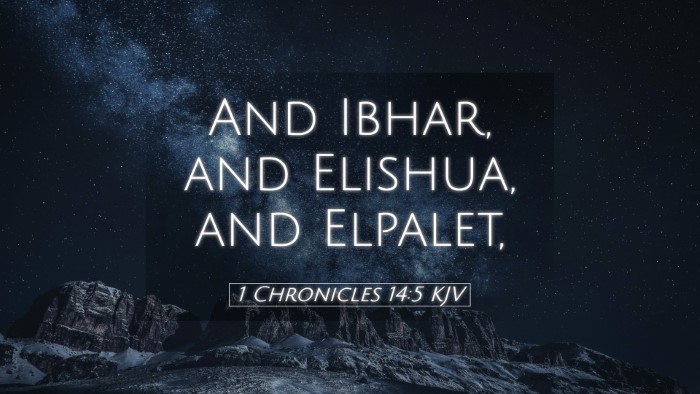Commentary on 1 Chronicles 14:5
Verse Text: "And David gathered all Israel together to Jerusalem, to bring up the ark of the Lord unto his place, which he had prepared for it."
Introduction
1 Chronicles 14:5 captures a pivotal moment in the history of Israel under King David. This verse serves as a reminder of David's devotion to worship and his commitment to reestablishing the presence of God among His people. Through combining insights from public domain commentaries, we will explore the significance of this moment and its implications for leaders, congregants, and scholars.
Historical Context
The Ark of the Covenant represented the tangible presence of God among His people and was a symbol of His covenant with Israel. Historically, it had been captured by the Philistines and later returned but was left in the house of Abinadab for several decades (1 Samuel 7:1-2). David’s desire to bring the Ark to Jerusalem expressed his dedication to worship and to unifying the nation under God's rule.
David’s Zeal for Worship
David exemplified a deep passion for the Lord’s presence, as highlighted by Matthew Henry's commentary, which emphasizes that David did not merely seek military victory but desired to worship God in a manner worthy of His holiness. Albert Barnes notes that David recognized the importance of the Ark for national unity and spiritual leadership. Through careful planning, he gathered the leaders and the people, signaling that worship was a communal duty.
The Importance of Unity
The gathering of Israel signifies the importance of unity in worship. Adam Clarke remarks that worship should not be a solitary act but a collective experience, binding communities together in reverence to God. David understood that a united Israel would be central to fulfilling God’s plans for them.
- Leadership: David's role as a leader in this endeavor encourages pastors and church leaders today to inspire their congregations to join together in worship.
- Community: The verse serves as a reminder that faith is not individualistic but is best expressed in community.
The Ark of the Covenant
The Ark’s journey to Jerusalem was not merely a political move, but it symbolized God's promise and presence. David's preparation for the Ark's return is an act of obedience. In Henry’s analysis, the seriousness of bringing the Ark back shows that David valued the spiritual component of leadership. Just as David prepared a place for the Ark, contemporary believers should prepare their hearts to receive God's presence.
Symbolism of the Ark
The Ark contained the tablets of the Law, Aaron's rod, and manna, emphasizing God's guidance, authority, and provision. Through bringing the Ark back, David reaffirmed the necessity of being reminded of God’s covenantal faithfulness. Clarke elaborates on this notion, suggesting that the Ark served as a visible reminder of God's holiness and His call for Israel to live by His commandments.
Preparation for Divine Encounter
David's preparation to bring up the Ark involved not only logistical organization but also spiritual preparation. Barnes highlights the importance of approaching God with holiness and sincerity. The reverence with which David treated this endeavor serves as a model for how worship leaders and congregants should prepare both their hearts and their environments for a divine encounter.
Lessons for Today
-
Worship as a Priority: Just as David prioritized the Ark's placement, today's leaders must prioritize worship in their ministries.
-
Collective Worship: This verse reinforces the idea that worship should unite individuals within the community.
-
Spiritual Readiness: Proper preparation—physically, emotionally, and spiritually—is essential for an authentic worship experience.
Conclusion
1 Chronicles 14:5 not only illustrates David's leadership and desire to bring God's presence among the people but also challenges modern readers to reflect on the significance of worship and community in their faith. The insights from Matthew Henry, Adam Clarke, and Albert Barnes collectively encourage a deeper understanding of the spiritual dimensions of leadership and worship as foundational aspects of life in God’s kingdom today.


